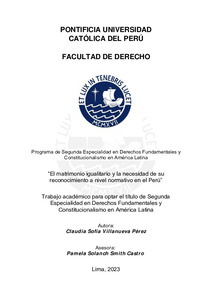El matrimonio igualitario y la necesidad de su reconocimiento a nivel normativo en el Perú
Abstract
El presente artículo académico analiza la situación del reconocimiento de
derechos a la comunidad LGBTIQ+ en América Latina y el Perú. Presenta las
múltiples iniciativas legislativas que se han dado en nuestro país para instaurar
el matrimonio igualitario, la unión civil u otras figuras análogas, pero que han sido
intentos infructuosos en materia de protección de derechos fundamentales.
Asimismo, muestra la incidencia directa que tiene la instauración del matrimonio
igualitario en el respeto y garantía de los derechos a la igualdad y no
discriminación, el libre desarrollo de la personalidad y los derechos civiles que
se derivan del mismo. Finalmente, presenta un caso emblemático de inscripción
del matrimonio igualitario ante el RENIEC, a fin de demostrar la
constitucionalidad de la medida y el debido control de convencionalidad que debe
aplicar el Estado peruano en estos casos, en función a las obligaciones
internacionales asumidas. Cabe mencionar que la presente investigación fue
realizada en base a un estudio de las más recientes fuentes doctrinales sobre la
materia, así como de la legislación y la jurisprudencia internacional más
relevante. This academic article analyzes the situation of the recognition of rights of the
LGBTIQ+ community in Latin America and Peru. It presents the multiple
legislative initiatives that have been taken in our country to establish equal
marriage, civil union or other similar figures, but which have been unsuccessful
attempts in terms of protecting fundamental rights. Likewise, it shows the direct
impact that the establishment of equal marriage has on the respect and
guarantee of the rights to equality and non-discrimination, the free development
of personality and the civil rights that derive from it. Finally, it presents an
emblematic case of registration of equal marriage before the RENIEC, in order to
demonstrate the constitutionality of the measure and the due control of
conventionality that the Peruvian State must apply in these cases, based on the
international obligations assumed. It is worth mentioning that this research was
carried out based on a study of the most recent doctrinal sources on the subject,
as well as the most relevant international legislation and jurisprudence.
Temas
Matrimonio--Aspectos legales
Derechos fundamentales--Perú
Perú. Tribunal Constitucional--Jurisprudencia
Derechos fundamentales--Perú
Perú. Tribunal Constitucional--Jurisprudencia
Para optar el título de
Segunda Especialidad en Derechos Fundamentales y Constitucionalismo en América Latina





